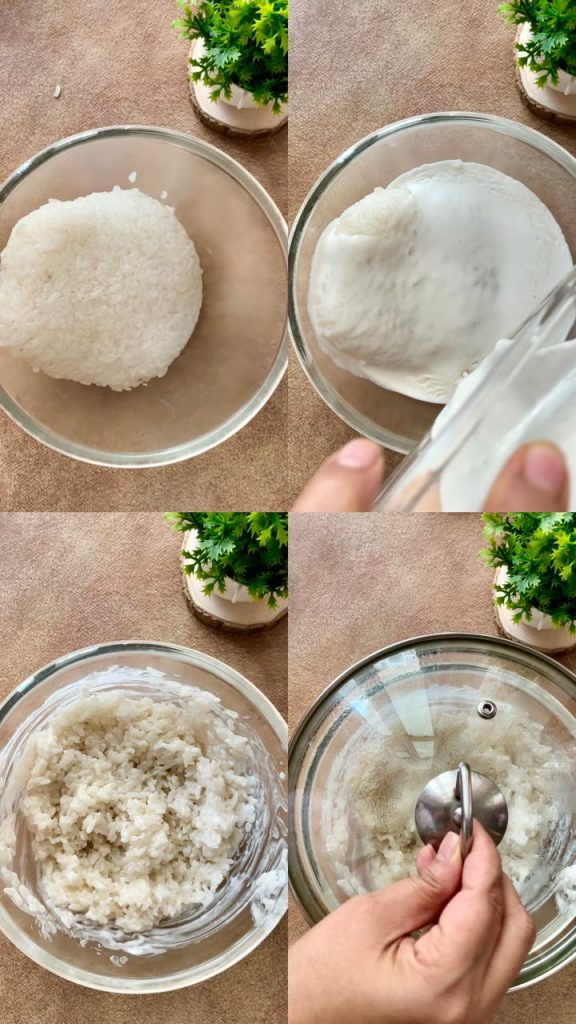
Mango Sticky Rice, known as “Khao Niew Mamuang” in Thai, is a beloved dessert that brings together the best of Thailand’s vibrant flavors and textures. This exquisite dish is a perfect blend of sweet, juicy mangoes, and rich, creamy coconut-infused sticky rice, creating a harmony of flavors that is both refreshing and indulgent.
The Perfect Mangoes
The key to a perfect Mango Sticky Rice lies in the mangoes. Ideally, you should use ripe, golden mangoes that are sweet and fragrant. These mangoes add a natural sweetness and a slight tartness that beautifully complements the rich, creamy rice. Look for mangoes that are soft to the touch but not mushy, ensuring they are at their peak ripeness.
The Creamy Coconut Sticky Rice
Sticky rice, also known as glutinous rice, is the foundation of this dessert. When cooked, it becomes tender yet retains a delightful chewiness that contrasts wonderfully with the smooth mango slices. The rice is soaked in a mixture of coconut milk, sugar, and a pinch of salt, giving it a luscious, creamy texture and a mildly sweet flavor. The coconut milk not only adds richness but also imparts a subtle, tropical aroma that elevates the dish.
Simple Yet Elegant Preparation
Despite its luxurious taste, Mango Sticky Rice is surprisingly simple to prepare. The sticky rice is cooked and then soaked in sweetened coconut milk until it absorbs all the creamy goodness. The mangoes are peeled, sliced, and arranged beautifully alongside the sticky rice. A drizzle of additional sweetened coconut milk over the top and a sprinkle of toasted sesame seeds or mung beans add the finishing touch.
A Visual and Culinary Feast
Mango Sticky Rice is not only a treat for the taste buds but also a feast for the eyes. The vibrant yellow of the mangoes paired with the pristine white sticky rice creates a visually stunning dish. This dessert is often served slightly warm, with the contrast between the cool mango and the warm, creamy rice providing a delightful eating experience.
Healthful Indulgence
While it’s undeniably a sweet treat, Mango Sticky Rice also offers some nutritional benefits. Mangoes are rich in vitamins A and C, as well as dietary fiber, while the coconut milk provides healthy fats. Sticky rice is a good source of energy, making this dessert both satisfying and nourishing.
Perfect for Any Occasion
Mango Sticky Rice is a versatile dessert that can be enjoyed on any occasion, from casual family meals to festive gatherings. Its unique combination of flavors and textures makes it a crowd-pleaser that will impress your guests and leave them craving more.
Mango Sticky Rice Recipe:
Ingredients:
1 cup sticky rice (soaked overnight)
1 1/2 cups coconut milk
1/2 cup sugar
1/4 teaspoon salt
2 ripe mangoes
1 teaspoon cornflour (cornstarch)
Water (for steaming the rice)
Roasted sesame seeds (for garnish)
Instructions:
Soak the sticky rice overnight in water. Drain the soaked rice and place it in a steamer lined with muslin cloth.
Steam the rice for about 20-25 minutes, or until it is tender and fully cooked.

In a saucepan, combine 1 cup of coconut milk, 1/4 cup of sugar, and 1/8 teaspoon of salt. Cook over medium heat, stirring continuously until the sugar is dissolved (about 3-4 minutes). Do not let it boil. Remove the coconut milk mixture from the heat. Reserve 1/4 cup of this mixture to make the coconut sauce.

Once the sticky rice is cooked, transfer it to a mixing bowl. Pour the remaining coconut milk mixture over the sticky rice while it’s still hot. Stir well to ensure the rice absorbs the coconut milk evenly. Cover and let it sit for about 10-15 minutes to allow the flavors to meld.

In a small saucepan, mix the reserved 1/4 cup of coconut milk with 1 teaspoon of cornflour (cornstarch). Stir until the cornflour is fully dissolved. Cook over low heat, stirring continuously, until the sauce thickens. Remove from heat and set aside.

Place a portion of the sticky rice on a serving plate. Drizzle the thickened coconut sauce over the rice. Sprinkle with roasted sesame seeds. Cut the ripe mangoes into slices and arrange them next to the sticky rice.

Serve the mango sticky rice warm or at room temperature. Enjoy your delicious Mango Sticky Rice!

Give this Mango Sticky Rice recipe a try and transport yourself to a tropical paradise with every bite. It’s a simple, yet indulgent dessert that captures the essence of Thai cuisine and the tropical allure of fresh mangoes.



















